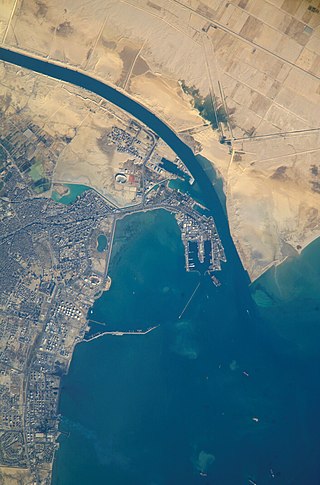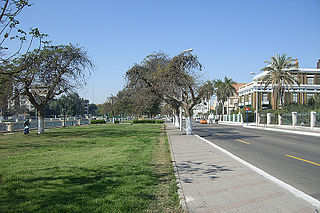See also
- Suez Crisis, a war fought in Egypt in 1956
- Suez Steel, a steel company located in Ababia, Egypt
- Suez Canal (disambiguation)
Suez is a seaport town in north-eastern Egypt.
Suez may also refer to:
Transport in Egypt is centered in Cairo and largely follows the pattern of settlement along the Nile. The Ministry of Transportation and other government bodies are responsible for transportation in Egypt, whether by sea, river, land or air.

The Red Sea is a seawater inlet of the Indian Ocean, lying between Africa and Asia. Its connection to the ocean is in the south, through the Bab el Mandeb strait and the Gulf of Aden. To its north lie the Sinai Peninsula, the Gulf of Aqaba, and the Gulf of Suez. It is underlain by the Red Sea Rift, which is part of the Great Rift Valley.

The Sinai Peninsula, or simply Sinai, is a peninsula in Egypt, and the only part of the country located in Asia. It is between the Mediterranean Sea to the north and the Red Sea to the south, and is a land bridge between Asia and Africa. Sinai has a land area of about 60,000 km2 (23,000 sq mi) and a population of approximately 600,000 people. Administratively, the vast majority of the area of the Sinai Peninsula is divided into two governorates: the South Sinai Governorate and the North Sinai Governorate. Three other governorates span the Suez Canal, crossing into African Egypt: Suez Governorate on the southern end of the Suez Canal, Ismailia Governorate in the center, and Port Said Governorate in the north.

The Suez Canal is an artificial sea-level waterway in Egypt, connecting the Mediterranean Sea to the Red Sea through the Isthmus of Suez and dividing Africa and Asia. The 193.30 km (120.11 mi) long canal is a key trade route between Europe and Asia.

Port Said is a city that lies in northeast Egypt extending about 30 km (19 mi) along the coast of the Mediterranean Sea, west of the Suez Canal. With an approximate population of 603,787 (2010), it is the fifth-largest city in Egypt. The city was established in 1859 during the building of the Suez Canal.


Ferdinand Marie, Comte de Lesseps was a French diplomat and later developer of the Suez Canal, which in 1869 joined the Mediterranean and Red Seas, substantially reducing sailing distances and times between Europe and East Asia.

Ismailia is a city in north-eastern Egypt. Situated on the west bank of the Suez Canal, it is the capital of the Ismailia Governorate. The city had an estimated population of about 430,000 in 2021. It is located approximately halfway between Port Said to the north and Suez to the south. The Canal widens at that point to include Lake Timsah, one of the Bitter Lakes linked by the Canal.


The Suez Company or Suez Canal Company, full initial name Compagnie universelle du canal maritime de Suez, sometimes colloquially referred to in French as Le Suez, was a company formed by Ferdinand de Lesseps in 1858 to operate the concession of the Suez Canal, which the company built between 1859 and 1869. Initially, French investors held half of the Company's stock, with Egypt's ruler Sa'id Pasha holding most of the balance. In 1875, financial distress forced Sa'id's successor Isma'il Pasha to sell the country's shares to the government of the United Kingdom. The Suez Company operated the canal until Egypt's new president Gamal Abdel Nasser revoked its concession in 1956 and transferred canal operation to the state-owned Suez Canal Authority, precipitating the Suez Crisis.

The Suez inscriptions of Darius the Great were texts written in Old Persian, Elamite, Babylonian and Egyptian on five monuments erected in Wadi Tumilat, commemorating the opening of the "Canal of the Pharaohs" between the Nile and the Bitter Lakes.

The Suez Port is an Egyptian port located at the northern tip of the Gulf of Suez on the Red Sea at southern entrance of the Suez Canal, serving the canal and the city of Suez. It is owned and operated by the Ministry of Transport's General Authority of Red Sea Ports, and is home to the Suez Canal Authority (SCA) shipyards.
The Red Sea is a body of water between Africa and Asia, and in the Indian Ocean.

The Canal of the Pharaohs, also called the Ancient Suez Canal or Necho's Canal, is the forerunner of the Suez Canal, constructed in ancient times and kept in use, with intermissions, until being closed for good in 767 AD for strategic reasons during a rebellion. It followed a different course from its modern counterpart, by linking the Nile to the Red Sea via the Wadi Tumilat. Work began under the pharaohs. According to Darius the Great's Suez Inscriptions and Herodotus, the first opening of the canal was under Persian king Darius the Great, but later ancient authors like Aristotle, Strabo, and Pliny the Elder claim that he failed to complete the work. Another possibility is that it was finished in the Ptolemaic period under Ptolemy II, when engineers solved the problem of overcoming the difference in height through canal locks.
The Suez Canal is commercial waterway connecting the Mediterranean Sea and the Red Sea. Suez Canal may also refer to:

El Matareya. Is a coastal town, is a region (markaz) in Egypt. Located in the Dakahlia Governorate, it is located south of Port Said, nicknamed the fishing town. It lies on the Lake Manzala coast in the northeastern part of the country.
The Suez Canal Corridor Area Project is a megaproject in Egypt that was launched on 5 August 2014 by President Abdel Fattah el-Sisi and was completed in 2015. The project aimed to increase the role of the Suez Canal region in international trade and to develop the canal cities of Suez, Ismailia, and Port Said.
The following is a timeline of the history of the city of Port Said, Egypt.

The Red Sea Station was a military formation of the Royal Navy. At various times it has also been referred to as Egypt Division and Red Sea and later the Red Sea and Canal Area. The Royal Navy had distinct formations for the Red Sea at intervals from 1846 until circa 1944-45.